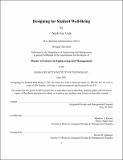Designing for Student Well-Being
Author(s)
Usta, Nazlı Ece
DownloadThesis PDF (3.116Mb)
Advisor
Kressy, Matthew S.
Terms of use
Metadata
Show full item recordAbstract
High levels of student stress are prevalent at MIT, especially among the undergraduate community. Many undergraduate students report that the MIT environment is harmful to their mental health. However, the current research efforts at MIT are mainly quantitative and do not capture the deeper insights required to understand the underlying stress factors and students’ needs. This thesis aims to contribute to the knowledge about undergraduate student well-being at MIT through in-depth qualitative research. It also seeks to explore a well-being intervention informed by the research findings. This thesis is composed of two studies: a series of interviews and a design case study. Sixteen one-on-one interviews with MIT undergraduate students were conducted to gather in-depth qualitative insights. Internal, social, and academic pressures to manage a high workload were identified as the main stress factors. Findings indicate that students want to remain productive while maintaining peace and cheerfulness in their MIT experiences. Students’ related needs are also discussed. The case study explored using an SMS bot to practice self-reflection, increase self-awareness, and prioritize well-being. Thirty-four MIT students participated in the study to use the bot every morning and night for two weeks. The changes in participants’ self-awareness, mental well-being, and perceived stress levels were measured through pre-, mid-, and post-study surveys and compared to a control condition with an alternative intervention (open-ended journaling through texting). The results are discussed. Participants shared their appreciation of the bot’s friendly and caring tone, simplicity of use, and content.
Date issued
2021-06Department
System Design and Management Program.Publisher
Massachusetts Institute of Technology